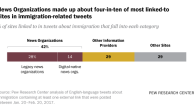When it came to this largest group of stories—the 47% about violence that did not offer explicit assessments of the war—what messages did the stories carry? In general, thanks to the subject matter alone, they tended to convey a sense of continuing peril and alarm.
Half these accounts of violence were straight ahead recitations of just the facts. A story on NBC’s Today Show from August 16 is typical. “Today in Iraq a car bombing killed at least 9 people and set a building on fire in Central Baghdad, and the search continues in northwestern Iraq where bombings this week killed at least 250 people,” it began.An almost equal number of these violence stories did contain suggestions of growing chaos but came up short of offering any larger analysis about what the events might mean. In one such report on the March 19 edition of MSNBC’s Tucker, for example, concluded, “Up and down the country scores more Iraqis dead in a series of drive-by shootings, plain old-fashioned murders and bomb blasts from around Baghdad right into the north. So really nothing special in Iraq today to make the four year anniversary, just violence as usual.”
Many of these accounts of violence, moreover, were short. Half of them were TV stories lasting 30 seconds or less. Indeed, if measured by the amount of time or space these stories made up of the coverage—newshole rather than stories—the number drops to 27% of the total.
This question of violent incidents represents the challenge to journalists covering what in effect is a state of demi-war, the period of nation building and potential civil war. Such daily acts of violence may require, not just deserve, coverage but they are by nature bleak. Yet if journalists do not report them, are they abdicating their responsibility?
In our survey of journalists in Iraq, some even worried about the fact that so many of the stories from Iraq depict a continuing litany of terror. “The daily attacks now seem to be covered pretty well but generally lack the sort of context that puts them in perspective for readers,” one print reporter working in Iraq wrote in an open ended response. “The greatest tragedy of the war has been how the media has in some way bored its audience with the violence.”




